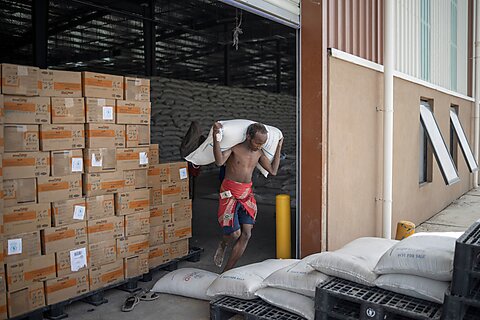Chris Edwards and Krit Chanwong
The US Agency for International Development (USAID) has announced it will restart sending food aid to Ethiopia. USAID had halted aid earlier this year after “uncovering a colossal scheme by government officials to steal donated grain.” US officials say it could be the largest theft of foreign food aid ever.
Last month, Cato published a study arguing for cuts to foreign food aid, which costs US taxpayers more than $2 billion a year. The study discussed the problems of food aid in conflict zones:
Armed conflicts around the world create demand for humanitarian aid. However, some experts argue that food aid can fuel or sustain conflicts, and thus can do more harm than good in some situations. Food aid can reduce political pressure for warring factions to reach settlements, and it can be seized by combatants and resold to buy weapons or other assets to prolong conflicts.
The USAID debacle in Ethiopia illustrates the dynamic. Ethiopia is experiencing a humanitarian crisis as a result of civil war and drought. Foreign food aid seems justified, but food aid to Ethiopia has been severely mismanaged. One investigation found that more than 7,000 metric tons of wheat and 215,000 litres of food oil have been looted by the various warring factions. In addition to theft, bureaucracy and violence have blocked aid from reaching people in need.
Feeding undernourished people abroad is a noble goal, but practical realities undermine government efforts to do so. The Ethiopian scandal has “cast an unflattering spotlight on the lax controls over the distribution of food and other international aid in crisis zones … including Somalia, Sudan, and South Sudan.”
The failure of food aid in Ethiopia led UN official David Del Conte to conclude, “The denial of relief assistance, and the manipulation of relief assistance, is very much entrenched in the Ethiopian experience.” In that country, “humanitarian assistance is part and parcel of the war machine,” he said. It is used by the various factions as a political weapon against opponents.
This has long been the case. The Central Intelligence Agency opined about Ethiopia’s dictator back in 1985: “He relies on international donors to support the rural population in government‐controlled areas of the north but vehemently opposes all efforts to provide aid to the drought victims in regions held by the insurgents.”
The problem with aid delivery isn’t just that food is stolen. In 2021, a UN food aid convoy ventured into Ethiopia’s war‐torn Tigray region with 445 trucks. Only 38 returned, as one of the warring parties apparently seized 407 of the vehicles.
With the resumption of US food aid to Ethiopia, we will see whether it works any better this time around. That seems unlikely, however, as food aid failures and corruption are a feature of Ethiopia’s sad history going back decades.




